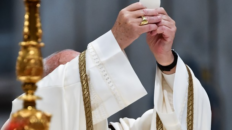THE HORROR OF SIN…AND THE MERCY OF GOD, There Is Hope for All
Today there is an unfortunate combination of two extremes: a blasé attitude toward sin, and a certain despair of forgiveness. Both are radically wrong.
THE HORROR OF SIN
The Old Testament is filled with references to sin and the need to have God take it away; not just forgive it, but take it away. “Happy the sinner whose fault is removed, whose sin is forgiven. Happy those to whom the LORD imputes no guilt” (Ps 32:1,2); “My iniquities overwhelm me, a burden beyond my strength” (Ps 38:4, 5); “Have mercy on me, God, in your goodness; in your abundant compassion blot out my offense. Wash away all my guilt; from my sin cleanse me. For I know my offense; my sin is always before me” (Ps 51:3, 4, 5); “Who can say, ‘I have made my heart clean, I am cleansed of my sin’?”(Pr 20.9). Also see Ps 32:5, Pr 5:22, Pr. 14:34 among others.
The New Testament is no less concerned with sin. Jesus came for one primary purpose: to make up for our sins by dying on the cross. It is crucial that we recover a biblical sense of the horror of sin. The saints and other holy people had this sense.
St. Ignatius of Loyola said:
“I would not for the sake of all creation, or for the purpose of saving my life, consider committing a single venial sin.”
St. Catherine of Genoa wrote:
When I had the vision in which I saw how much the shadow of the smallest act against God matters, I do not know why I did not die. I do not wonder that hell is so horrible, seeing that it is made for sin. But, horrible as it is… I think … that even there God shows mercy, so terrible does even the shadow of a venial sin seem to me.
St. Francis of Assisi said:
Had I committed but one little sin I would have ample reason to repent of it for the rest of my life.
St. Teresa of Avila put it:
Follow the advice [to please God] until you find you have such a fixed determination not to offend the Lord that you would rather lose a thousand lives, and be persecuted by the whole world, than commit one venial sin.
Cardinal Newman wrote:
The Church holds it better for sun and moon to drop from Heaven, for the earth to fail, and for all the many millions on it to die of starvation in the most extreme agony… than that one soul… should commit one single venial sin, should tell one willful untruth or should steal one poor farthing…
What is so terrible about sin? Why the fuss? Because we are called to an intimate life of love with God, a kind of marriage (Ez. 16; Is. 52, Hos. 1-3). If we are to be in this marriage, we must be holy, and every act that brings us away from that goal is a terrible tragedy.
…THE MERCY OF GOD
The Old Testament spoke abundantly of the mercy of God. For example, “Give thanks to the Lord for he is good, his mercy endures forever… Who alone does great wonders, for his mercy endures forever…” (Ps. 136:1,4). The litany goes on for 26 verses. One of Pope John Paul II’s earliest encyclicals was Dives in Misericordia, literally “[God, who is] rich in Mercy” (Eph. 2:4). It was about the infinite mercy of God. St. Faustina’s divine Mercy Chaplet is aimed at our becoming more aware of the infinite mercy of God. God told her it was his greatest attribute.
ST. MARGARET OF CORTONA
Nothing speaks more of God’s mercy than the life of St. Margaret of Cortona. She was born in Laviano, Tuscany (present-day Italy) in 1247. Her mother raised her with great love and tenderness, and taught her to love God and strive for virtue. Thus, her mother’s death when Margaret was only seven was a tragic blow.
Her father, a small-time farmer, remarried two years later. He was weak and indulgent at times_spoiling Margaret in the process_and excessively violent at others. His new wife had no use for his high-spirited, pleasure-loving daughter, and attempted with harshness to undo the spoiling her husband had accomplished. Caught between her parents’ extremes, neither of which provided the love she had known and which she desperately sought, she looked for love outside her home, to the boys of her town. Her striking beauty, combined with her spirited nature, made her irresistibly attractive to them. She loved the attention, and to keep it gave in to their lustful desires. Before she was 17 the whole town knew of her sexual adventures.
At 18 she ran off with a nobleman to live in his castle in the hills of Montepulciano. Though he promised to marry her, he never did, so she lived openly as his mistress for nine years. Her sinful life shocked the entire region. She added insult to injury by often riding a magnificent horse defiantly through the streets of Montepulciano dressed in expensive jewels and fancy clothes. When she gave birth to an illegitimate son, Margaret gave up on the hope of marriage and resigned herself to the situation.
Not surprisingly, in spite of her somewhat glamorous life, Margaret was often unhappy. She would find an out-of-the-way room and say to herself, “How good it would be to pray here! In such peace I might become sincerely repentant!” She cried over her sins, hoping one day to reform and receive God’s forgiveness and mercy. Once a friend pleaded with her, “You wretch, how much lower will you bring yourself?” She covered her face with her hands and groaned. Then as if she saw the future, she cried out, “Don’t worry! The day will come when you will call me a saint, because I will have become so holy!”
Margaret continued her sinful life, torn between pleasure and guilt, comfort and disgust. She felt trapped. She hid her agony from everyone. It was only through tragedy that she was set free.
When she was 27 her nobleman failed to reurn from a business trip on time. After days of searching, she was led by his dog to his murdered body, covered with leaves in the woods. She screamed and fainted.
When she recovered she faced squarely the issue of her own death, her destiny? Where was her lover’s soul now? Where would she end up for all eternity?
She resolved to go home to her father. Dressed as a penitent, she and her young son walked to Laviano. There, she threw herself at the feet of her father and asked forgiveness and shelter. He gave her both.
However, trouble brewed almost immediately. Margaret would often kneel at the door of the local church with a penitential rope around her waist and arms outstretched for all to see she was a repentant sinner; once she even confessed publicly her past sins in the church. All this, combined with the continued bad blood between her and her stepmother brought things to a head. She and her son were driven out.
She walked away leading her crying son, uncertain where to go. She thought of returning to the comfort of her past sinful life. The devil tempted her: “You still have your beauty, your youth, your wit… Why not go back?” But God spoke to her heart, inspiring her to go to Cortona and seek refuge with the Franciscans.
At the city gate she met two kind women who brought her to the Franciscan house. She humbly asked entry into the Third Order of the Franciscans, that she might do penance for the rest of her life. She was accepted on a trial basis to see if her conversion would last. She attended Mass each day, spent long hours in prayer, worked as a midwife and cared for the poor. Finally, after three years, her spiritual director agreed she was ready. In 1277, at the age of 30, Margaret entered the Third Order of St. Francis.
She began to live a life of deep penance, wearing rags for clothing, sleeping on the ground with a stone or piece of wood as a pillow, and seeking to humiliate herself in every way. She returned to Montepulciano one Sunday and asked pardon of the congregation.
Her beauty, which had been the occasion of her ruin, and which still turned the heads of the men in Cortona, she proposed to destroy by cutting and scarring her face. Her spiritual director said no. When she asked God to remove any grace or beauty that others might admire in her, He said to her, “By your beauty I wish to encourage sinners to come to you, to be converted, and thus to give me greater glory.”
When she entered the Third Order she sent her son to the Franciscan school in Arezzo and moved to a shack near the church. There she began to have visions of the Lord. When she was at prayer the Lord seemed to speak plainly to her. For some time He called her, “my poor little one,” but after she had asked Him for a more intimate title through much prayer and penance, He began to call her, “My daughter.” This filled Margaret with great joy, and an ever greater zeal for prayer and penance. She ate only a slice of bread and some water with raw vegetables and nuts. She denied herself all comforts, wearing a hair shirt and whipping herself. She spent most nights contemplating the sufferings of Christ and weeping for her sins.
Once Our Lord said to her, “My daughter, I will place you among the Seraphs, among the virgins whose hearts are flaming with the love of God.”
“How can that be,” she asked, “since I have spoiled myself with so many sins?”
“My daughter, your many penances have purified your soul from all the effects of sin to such a degree that your contrition and sufferings will reintegrate you into the purity of a virgin.” For her love of chastity she would be “placed among the virgins.”
Margaret prayed for the grace to humble herself before all creatures for the love of God. The Lord agreed, saying, “This… will exalt you among the blessed in heaven… You are the third light of the Franciscan Order” (After St Francis, and St Clare).
Margaret was indeed humbled, as many in Cortona began out of jealousy to spread scandalous rumors about her. Even the Franciscans began to suspect her. Her response to her slanderers was to pray for them and even to ask their forgiveness. For seven years she lived under suspicion, deprived of her spiritual director, her ecstasies and special graces. However, this trial was followed by a period of great grace.
After raising her to the title of “my daughter,” the Lord gave Margaret many other titles, including, “mother of sinners,” “lily of innocence,” “rose of charity,” His “sister,” and “pearl of his heart.”
However, her most treasured title was “spouse.” She received this one day in August, after holy communion. She was given a white robe, a wedding ring and a crown from the Lord’s angels. Then Jesus declared, “You are my spouse.” This “mystical marriage,” is the highest spiritual state possible, in which the soul is constantly aware God’s presence and love.
People came from miles around to seek Margaret’s advice and prayers, and many miracles occurred at her intercession. She showed great love for the poor, depriving herself of almost everything_including her coat in mid-winter_to provide for them. She founded a hospital in 1286 and worked there as a nurse, preferring to serve those with the most repulsive diseases. She founded two groups: “The Little Poor Sisters,” to serve at the hospital, and the confraternity of Our Lady of Mercy, to serve the City’s poor.
The Lord revealed to Margaret a month in advance, when she would die. For the final 17 days of her life her only nourishment was the Holy Eucharist. She died peacefully on February 22, 1297. She was 50 years old. Almost immediately miracles began to occur at her grave, including the raising to life of twelve persons. Her body is incorrupt to this day, visible beneath the main altar of the Basilica of Cortona, “St. Margaret’s.” She was canonized in 1728.
* * *
What an awesome, merciful God it is who can raise us from the depths of sin to the heights of holiness as he raised Margaret and others such as St. Augustine and St. Mary Magdalene. No one is beyond God’s endless mercy.




Add comment